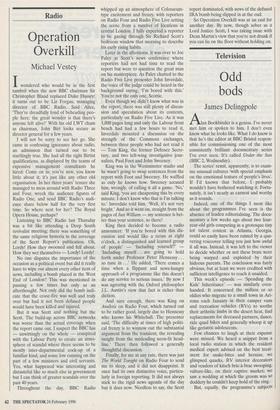Radio
Operation Overkill
Michael Vestey
Iwondered who would be in the first tumbril when the new BBC chairman Sir Christopher Bland replaced Duke Hussey: it turns out to be Liz Forgan, managing director of BBC Radio. Said Alice, `They're dreadfully fond of beheading peo- ple here: the great wonder is that there's anyone left alive!' With his old LWT chum as chairman, John Birt looks secure as director general for a few years.
I will not be sorry to see her go. She came in confessing ignorance about radio, an admission that turned out to be startlingly true. She had all the right Birtist qualifications, as displayed by the teams of expensive management consultants he hired: Come on in; you're new, you know little about it; it's just like any other old organisation. In her three years' tenure she managed to mess around with Radio Three and Four, wreck the audience figures of Radio One, and send BBC Radio's audi- ence share below half for the very first time. So where next for her? The Royal Opera House, perhaps?
Listening to BBC Radio last Thursday was a bit like attending a Deep South revivalist meeting; there was something of the same religious hysteria in the coverage of the Scott Report's publication. Oh, Lordy! How they swooned and fell about. How they wet themselves — Lordy! Lordy!
No one disputes the importance of the occasion as a political event but did it really have to wipe out almost every other item of news, including a bomb placed in the West End of London? This was mentioned in passing a few times but only as an afterthought. Not only did the bomb indi- cate that the cease-fire was well and truly over but had it not been defused people would have been killed and injured.
But it was Scott and nothing but the Scott. The build-up across BBC networks was worse than the actual coverage when the report came out. I suspect the BBC has — unwittingly on the whole — conspired with the Labour Party to create an atmo- sphere of scandal where there seems to be mostly inter-departmental cock-up of a familiar kind, and some low cunning on the part of a few ministers and civil servants. Yes, what happened was interesting and distasteful like so much else in government but I can think of greater scandals over the past 40 years.
Throughout the day, BBC Radio whipped up an atmosphere of Colosseum- type excitement and frenzy, with reporters on Radio Four and Radio Five Live setting the scene from a number of locations in central London. I fully expected a reporter to be gazing through Sir Richard Scott's bedroom window that morning to describe his early rising habits.
Later in the afternoon, it was over to Joe Paley at Scott's news conference where reporters had not had time to read the report but were to question the great man on his masterpiece. As Paley chatted to the Radio Five Live presenter John Inverdale, the voice of the judge could be heard in the background saying, 'I'm bored with this.' You're not the only one, Scottie.
Even though we didn't know what was in the report, there was still plenty of discus- sion and speculation about its contents, particularly on Radio Five Live. As it was 1,800 pages long and only the Labour front bench had had a few hours to read it, Inverdale mounted a discussion on the strength of the Commons exchanges, between three people who had not read it — Tom King, the former Defence Secre- tary, and two left-wing investigative jour- nalists, Paul Foot and John Sweeney.
King was in the 'Westminster studio and he wasn't going to swap sentences from the report with Foot and Sweeney. He waffled as only he knows how. Sweeney accused him, wrongly, of calling it all a game. 'No,' said King, 'you are cheapening this by every minute. I don't know who that is I'm talking to.' Inverdale told him. 'Well, it's not very bright.' And so it went on, straight from the pages of Just William — my sentence is bet- ter than your sentence, so there!
King then decided to become a radio announcer: 'If you're bored with this dis- cussion and would like a rerun at eight o'clock, a distinguished and learned group of people' — 'Including yourself?' 'Including myself . . . are going to hold forth under Professor Peter Hennessy . . . so tune in .. .' He added, 'There comes a time when a flippant and news-hungry approach of a programme like this doesn't do any service to serious issues.' By now I was agreeing with the Oxford philosopher J.L. Austin's view that fact is richer than diction.
And sure enough, there was King on Analysis on Radio Four, which turned out to be rather good, largely due to Hennessy who knows his Whitehall. The presenter said, 'The difficulty at times of high politi- cal frenzy is to winnow out the substantial argument from the transient, the revealing insight from the misleading neon-lit head- line.' There then followed a generally thoughtful discussion.
Finally, for me at any rate, there was just The World Tonight on Radio Four to send me to sleep, and it did not disappoint. It once had its own distinctive voice, particu- larly in foreign reporting. It did not always stick to the rigid news agenda of the day but it does now. Needless to say, the Scott report dominated, with news of the defused IRA bomb being slipped in at the end.
So Operation Overkill was at an end for another day. By now, though sober as a Lord Justice Scott, I was taking issue with Dean Martin's view that you're not drunk if you can lie on the floor without holding on.


























































 Previous page
Previous page